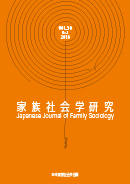Volume 30, Issue 2
Displaying 1-23 of 23 articles from this issue
- |<
- <
- 1
- >
- >|
Essay
-
2018 Volume 30 Issue 2 Pages 183-184
Published: October 31, 2018
Released on J-STAGE: October 31, 2019
Download PDF (174K)
Article
-
2018 Volume 30 Issue 2 Pages 185-196
Published: October 31, 2018
Released on J-STAGE: October 31, 2019
Download PDF (383K)
Special Issues 30 Years History of the Japanese Journal of Family Sociology: Focusing on Editorial System
-
2018 Volume 30 Issue 2 Pages 197-203
Published: October 31, 2018
Released on J-STAGE: October 31, 2019
Download PDF (270K) -
2018 Volume 30 Issue 2 Pages 204-208
Published: October 31, 2018
Released on J-STAGE: October 31, 2019
Download PDF (338K) -
2018 Volume 30 Issue 2 Pages 209-220
Published: October 31, 2018
Released on J-STAGE: October 31, 2019
Download PDF (434K) -
2018 Volume 30 Issue 2 Pages 221-227
Published: October 31, 2018
Released on J-STAGE: October 31, 2019
Download PDF (262K)
NFRJ Corner
-
2018 Volume 30 Issue 2 Pages 228-230
Published: October 31, 2018
Released on J-STAGE: October 31, 2019
Download PDF (180K) -
2018 Volume 30 Issue 2 Pages 231-235
Published: October 31, 2018
Released on J-STAGE: October 31, 2019
Download PDF (304K) -
2018 Volume 30 Issue 2 Pages 236-241
Published: October 31, 2018
Released on J-STAGE: October 31, 2019
Download PDF (392K) -
2018 Volume 30 Issue 2 Pages 242-246
Published: October 31, 2018
Released on J-STAGE: October 31, 2019
Download PDF (247K) -
2018 Volume 30 Issue 2 Pages 247-249
Published: October 31, 2018
Released on J-STAGE: October 31, 2019
Download PDF (204K)
Book Reviews
-
2018 Volume 30 Issue 2 Pages 250-251
Published: October 31, 2018
Released on J-STAGE: October 31, 2019
Download PDF (149K) -
2018 Volume 30 Issue 2 Pages 252-253
Published: October 31, 2018
Released on J-STAGE: October 31, 2019
Download PDF (161K) -
2018 Volume 30 Issue 2 Pages 254-255
Published: October 31, 2018
Released on J-STAGE: October 31, 2019
Download PDF (155K) -
2018 Volume 30 Issue 2 Pages 256-257
Published: October 31, 2018
Released on J-STAGE: October 31, 2019
Download PDF (141K) -
2018 Volume 30 Issue 2 Pages 258-259
Published: October 31, 2018
Released on J-STAGE: October 31, 2019
Download PDF (153K) -
2018 Volume 30 Issue 2 Pages 260-261
Published: October 31, 2018
Released on J-STAGE: October 31, 2019
Download PDF (152K) -
2018 Volume 30 Issue 2 Pages 262-263
Published: October 31, 2018
Released on J-STAGE: October 31, 2019
Download PDF (157K) -
2018 Volume 30 Issue 2 Pages 264-265
Published: October 31, 2018
Released on J-STAGE: October 31, 2019
Download PDF (154K) -
2018 Volume 30 Issue 2 Pages 266-267
Published: October 31, 2018
Released on J-STAGE: October 31, 2019
Download PDF (165K)
Book Reviews
-
2018 Volume 30 Issue 2 Pages 268
Published: October 31, 2018
Released on J-STAGE: October 31, 2019
Download PDF (133K) -
2018 Volume 30 Issue 2 Pages 269
Published: October 31, 2018
Released on J-STAGE: October 31, 2019
Download PDF (140K) -
2018 Volume 30 Issue 2 Pages 270
Published: October 31, 2018
Released on J-STAGE: October 31, 2019
Download PDF (128K)
- |<
- <
- 1
- >
- >|
